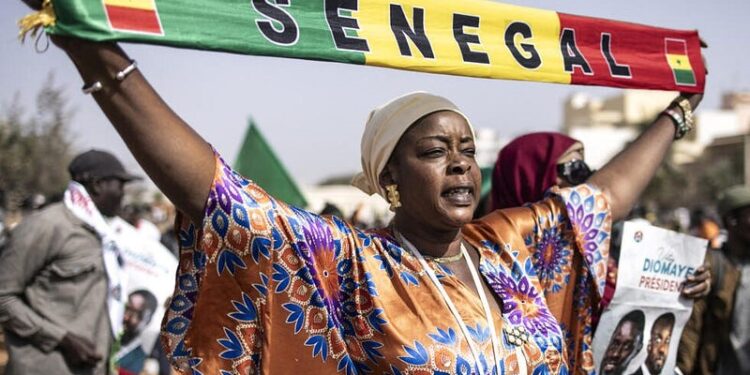Senegal is set to hold its delayed Presidential elections on Sunday amid a tense political atmosphere caused by the failure of President Macky Sall to postpone the vote and the release of two key opposition figures from prison.
According to the Associated Press, the delayed elections have sparked violent protests testing one of West Africa’s most stable democracies.
Opposition leader Ousmane Sonko was released from prison last week sparking wild jubilations in the streets of Dakar and adding to the excitement of the much-anticipated elections.
Alioune Tine, the founder of Afrikajom, a Senegalese think tank, said that Sunday’s election has a set grim record in Senegal’s political history with various rights groups accusing President Macky Sall of repressing the media, Civil society, and the opposition.
- “It was the longest and most violent presidential election process, with the most deaths, injuries, and political detainees,” said Tine.
Human Rights Watch said over 1000 opposition members and activists were arrested across the country in the last three years. President Macky Sall has faced accusations of wanting to hold on to power which he has denied many times.
Recommended reading: Senegal fixes presidential election for March 24
Presidential Contestants
There are 19 candidates in the race, the highest in Senegal’s history.
The ruling party has picked Amadou Ba, 62, a former prime minister and finance minister as its candidate.
Amadou Ba faces a crowded opposition of 18 contestants with the most prominent being 43-year-old former tax inspector Bassirou Diomaye Faye, who gained enormous popularity after being backed by firebrand opposition leader Ousmane Sonko.
Both Sonko and Faye were released from jail on March 14 due to an amnesty proposed by Sall after months in detention, and have since pushed the momentum of the election to the opposition ranks.
Anta Babacar Ngom, the first woman to run for president in years, is the only female presidential candidate in the race, but few expect her to gain a significant share of the vote.
Other contenders in the race include Idrissa Seck, who has run in previous races and served as prime minister some 20 years ago, and Khalifa Sall, a former mayor of Dakar and longtime opposition figure.
The Issues
Analysts in the country say unemployment remains the biggest issue amongst most Senegalese going into the elections. Around half of Senegal’s population of 17 million are under 18, according to Afrobarometer, an independent survey research group.
Poverty also remains a challenge in the country according to Marieme Wone Ly a former Senegalese political party leader.
- “The big question right now for the Senegalese election is how are we going to break out of poverty,” said Marième Wone Ly, “We can’t see the end of the tunnel. People don’t see it.”
According to World Bank Data, about a third of Senegalese live in poverty. Thousands have fled to the West in search of better lives often experiencing risky and life-threatening journeys.
Senegal’s election was originally slated for Feb 25th before it was abruptly delayed by President Macky Sall on Feb 3 citing risks caused by dispute over the candidate list as the reason for the postponement.
The news of the postponed elections sparked violent protests, leading the country’s highest constitutional authority, the Constitutional Council, to reject attempts to delay the vote and extend Sall’s mandate beyond April 2.
What To Know
Sunday’s election is set to be Senegal’s fourth democratic transfer of power since it gained independence from France in 1960. The West African country has enjoyed the reputation of being one of the most stable democracies in the region.
Around 7.3 million people are registered to vote among Senegal’s nearly 17 million population, more than 60% of whom are under 25.














